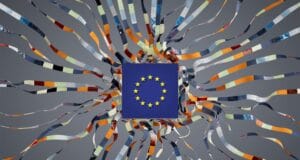This content was created by the Data Sharing Coalition, one of the founding partners of the CoE-DSC.
The Data Sharing Coalition supports organisations with realising use cases at scale to exploit value potential from data sharing and helps organisations to create required trust mechanisms to share data trusted and secure. In our blog section ‘Q&A with’, you learn more about our participants and their thoughts, vision and ideas about data sharing. Otto Lagemaat, Director at Doccle NL, shares his thoughts.
1. Could you introduce your organisation?
Doccle is a digital, community-driven, and cross-domain consumer platform with 2.5 million consumer users (of which 45% are Belgian households). We started in Belgium and expanded activities to the Netherlands. Our platform is used by more than 10,000 large organisations, including the Belgian government. Furthermore, it is becoming a part of various data sharing ecosystems in various sectors, e.g. estate agents (when people want to buy a house), insurers (when people want to get insurance) and healthcare.
Doccle assists individuals with their personal administration – either via our mobile app or our website – and enables them to receive, process, and store documents from a wide range of companies they have been in contact with. In addition to documents, we also created a data wallet for consumers. This is a personal safe that the consumer can fill with documents and data. The consumer is the owner of this data and can grant an information request and share their documents and data. This can only be used for the purpose and the amount of time (e.g. 1 month) that was stated in the request. After this time period, the access will be denied. This offers consumers a modern user experience and personal, validated data can be re-used cross sectorally, which is very efficient. We are also developing a personal data safe for the Flemish government and we are active in the Netherlands, where we focus on various use cases related to data sharing (see the answer to question 2).
We joined the Data Sharing Coalition to learn alongside other participants and to gain new insights. We also strongly believe in the value of realising use cases to gain new insights.
2. To what extent is your organisation involved in data sharing (within and across sectors)?
Data sharing with consent of the user (by ticking ‘consent’ or ‘reject’) and an audit trail for consumers and organisations are our core focus. We are currently working on various use cases in which we offer our platform and participate by thinking about the design of the cases.
- Worry-free living. When buying a house, users can re-use their data and share this by having it retrieved by their notary, broker, financial advisor and insurer. The right information can be reached in every residential phase, at the touch of a button. This way, we create a chain of information exchange and unburden the consumer when buying and selling real estate. With the personal data store, we improve convenience, clarity and certainty – for both consumers and market parties. For example, Doccle offers a safe within the carefree real estate project (Zorgeloos Vastgoed).
- Life-long learning. Users can store information about their achieved learning goals, diplomas, and certification. Then, they can share it with trainers and coaches to take the next steps in their personal development. They get and maintain an overview of their training needs and can easily exchange this data when joining an organisation.
- Work and income. We assist users with an income/debt portal so they can easily receive all financial arrangements to which they are entitled. Doccle offers the safe and works together with the organisations/parties that know all about certain regulations. For example, people who have debts now have to visit all kinds of agencies online (such as counters of municipalities). We provide a simple, single digital counter for all arrangements that every resident or care provider can use. Users don’t only see what they are entitled to, it can also be granted immediately. The organisations/parties who have the rules rely on the checks in the digital counter.
3. Why is or should sharing data be important for your industry or domain?
A consumer is continuously in contact with various organisations. Daily, (s)he receives information from and has to share information with organisations active in different domains. Doccle believes that people want to have an overview of their administration and that they want to be able to exchange this information in an easy, safe manner. Data, reliability and traceability are key in today’s society. Giving permission for data exchange and knowing that you have given that permission must become commonplace. The European legislation also states that this has to happen in a few years’ time.
4. What are the most promising data sharing developments and trends you see in your sector?
People’s mindsets are shifting, they want to be self-reliant. Simultaneously, trust in society and in organisations is decreasing, amongst others due to frequent news about data leaks and companies that sell your data to others. Consumers are now more aware of the importance of their data and privacy. They ask themselves: I am saying yes, but to what? And organisations are experiencing restrictions due to legislation and they have to change the way they handle data of others. Thus, the reliability and traceability of the source of data is becoming increasingly important.
5. How do you see the future of data sharing, and what steps are you currently taking in that direction?
Legislation tries to enable citizens to have more control over their personal data. For example with the GDPR and KYC (Know Your Customer, customers have to identify themselves). However, this legislation can only be met to a certain extent or at very high costs, since companies have to keep up and change their systems. No proper identification is possible and citizens themselves hardly play an active role when it comes to data exchange. In the coming years, the convenience, the security and the level of control of citizens will need to increase. Citizens themselves will play a much bigger role in the exchange of data.
We have invested in a data sharing platform for the secure exchange of data, documents, and structured questions. We are currently investing in Solid technology to further support this (Solid technology lets people store their data securely in decentralised data stores called Pods. People can grant or revoke access to any slice of their data as needed. It’s your data and your choice). Until now, we offer this to consumers and companies but in the coming months we will also offer this to freelancers and SME entrepreneurs.
6. Why are you participating in the Data Sharing Coalition?
We joined the Data Sharing Coalition to learn alongside other participants and to gain new insights. It enables us to expand our network and to meet like-minded people. We strongly believe in the value of realising use cases to gain new insights. If participants wish to do so, they can use our platform for innovative projects in which consumers are involved. Join us and the Data Sharing Coalition and we will learn together!




